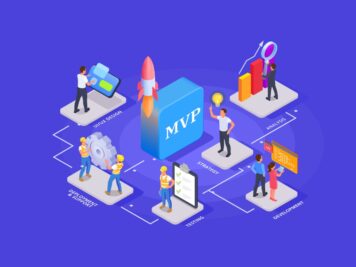From thinking about hiring an offshore software development team to feeling convinced about it is a long journey. You have to go through a tiresome decision-making process. But this doesn’t guarantee smooth sailing ahead. Once you decide to go forward with outsourcing software development, next, you will be bugged by “How to do it correctly?” In other words, how to secure the desired benefits while minimizing the tech risks.
Well, you are not alone in this quest. Many companies have started to outsource software development as they realized a hybrid or remote operating model can make their product development process hassle-free and less expensive. But a significant number of companies are hesitant about adopting offshoring as they feel the risks and hassles can overshadow the benefits.
Lack of exposure to offshore teams may be a source of the concern. But having a remote engineering team is not a new concept. Many enterprises and startups have already adopted the process in the past decade. It is just going mainstream now due to factors like the COVID-19 pandemic, recession, and others.
This article will provide an overview of the necessary points to keep in mind to find, examine, and test potential offshore software development teams. We derived the insights while managing offshore software development teams for 180+ businesses, comprising VC-funded startups, growth-stage and mature-stage companies, and big techs in the last 20 years. Let’s discuss them one by one.
A. Finding the potential offshore software development team
Most of the software development firms across the world claim they offer the “best” offshore software engineering teams. Thanks to high-speed internet, finding these companies has become easier. But shortlisting the right ones is difficult.
Businesses now focus primarily on 3 types of remote teams. Offshore, onshore, and nearshore. Onshore teams share the same geographical location with the product team. They come with the benefit of the same time zone, but they are expensive. Cost-wise nearshore teams are better and they also share the same time zone. However, they do face resource constraints sometime.
Offshore development teams are mostly more different continents with which the product owners don’t share a time zone. Teams under this segment come from countries like India, Ukraine, Vietnam, the Philippines, and others. They are less expensive and great in terms of talent. You may find time zone difference as an obstacle but, in reality, it is an advantage. Seamless collaboration between the in-house developers and offshore software developers can ensure sprints run without breaks as when one logs out, the other logs in.
Dedicated offshore software teams act like your own in-house software teams. They are more like your extended offshore software teams. Generally, they include product managers, tech architects, domain experts, and software developers capable of making decisions and operating efficiently without much interference in the technical execution. So, in a nutshell, these teams can work independently, have highly skilled individuals and decades of product development experience, and are capable of guiding you on the tech product roadmap strategy and execution.
Now, the following questions may arise:
- “How can I trust anyone with the development of my proprietary product?”
- “How much effort is required to manage the offshore software team?”
- “Will they fit in the culture of the company?”
- “What do I require to get started?”
- “How can I determine the credibility of potential partners?”
- “Do I need an offshore team or a nearshore team?”
- “How can they help me?”
- “Is there any risk associated?”
These are the most common questions asked by the majority of the founders and technology heads of tech companies. The answer to these questions depends on your priorities and needs, and I have mentioned the most important points to help you make the right decision.
- First decide, offshore or nearshore team?
Want greater control over the day-to-day activities of the team? If yes, then go for the nearshore option. But it has a catch, you will limit your access to quality talent, the cost may not be favorable, and it can increase the management overheads. Good dedicated software teams are generally autonomous in decision-making and have tested and refined operating and delivery models to reduce communication overheads.
So, look for an offshore software development partner with considerable experience of handling similar businesses as yours and can provide some work time overlap. - Secondly, prepare a list of credible options.
There are many legit listing websites where you can easily access the list of potential offshore software development partners. These websites can provide you with a quick reference to create an initial list of potential partners. Look for verified customer video testimonials, especially from CTOs, and technology heads instead of mid-level managers or developers. Also, search for their customer profiles to check if they are similar to yours.
- Thirdly, ask your close network.
Referrals can be a great source of finding the right offshore software development partners. Just check within your network and see if anyone has done it before you. You can get unbiased and honest feedback from their experiences.
Finding good software engineering service providers can be quick and easy if you know the right platforms to search for it. The real challenge comes when you start with the evaluation process.
B. Evaluating the potential software development team
To achieve the desired success, you need to select the right product development partner which can provide the right blend of people, processes, and values. Let’s break the evaluation process into questionnaires to ease the decision-making process.
- Are you an early, growing, or mature startup?
Startups at different growth stages will have different requirements. If you are an early-stage startup (Pre-seed or Seed) then you should look for an offshore software development team that can quickly build a scalable MVP or transform MVP into a market-ready tech product.
On the other hand, for a fast-growing startup (Series A, Series B, etc.) you should look for someone that can quickly and efficiently scale the product team to handle the surge of new customers while ensuring architectural integrity.
For matured startups and big techs, product resiliency and stability are priorities. They must find partners who can independently work on creating new features, add new technologies like AI/ML, Blockchain, Big Data, and IoT, etc., to the existing tech product and re-architect the system if and when needed.
- Pricing?
Do you have a fixed or short-term project, or have a long-term/strategic project in mind? For long-term projects with a critical impact on business, always go for the time and material pricing model. It will avoid unnecessary issues that can lead to startup failures, especially in an environment of uncertainty.
As a thumb rule, if you are looking for a long-term software development team, then go with an offshore partner with longer average customer tenure. Longer tenures showcase a higher level of trust and ability to deliver on product roadmap versus a shorter tenure requiring less tech expertise.
- Can I trust them?
It is crucial to have a partner that can be trusted with IP protection and rely on all software engineering needs. Onboard the one which has all the technical capabilities you need or may need in the future and have a considerable volume and quality of customer base. Check if the testimonials provided by the company are credible and relevant. Case studies and whitepapers are also crucial. Lastly, check if they are authorized partners with reputed technology brands like Google, Amazon, Microsoft, etc.
- Do they match your culture?
Remember, offshore software development teams should act like an extended part of in-house product teams. It is not possible to work effectively if the work cultures are different. If you are a startup, hire teams with a good experience in startup product development at your stage and above. Teams that are well-aligned with the startup ecosystem can drive innovation for your startup.
- The relative size difference?
Ideally, the team size of the vendor should not be too large or too small compared to your team’s size. If the offshore software development partner is considerably larger compared to your startup, then you may not get the proper attention from the tech experts. Your developers may also fail to match the expected quality. If they are too small, then they may not meet your software engineering needs. Look for the perfect balance.
C. Testing the potential offshore software development team
Here the idea is to smartly test the capabilities of the offshore software development team before committing for a longer duration of time, involving higher sums of money. You can try your selected partner in these three ways:
- Do a trial run
This method takes around two weeks and can help you evaluate about 60% of the vendor’s work potential. Follow the below-mentioned points:
- Negotiate for two weeks of a trial run with the team and assess them based on design, code, quality, productivity rate, problem-solving approach, communication overheads, and agile methodologies.
- Share a limited version of the product and, with a team of 2-3 members, ask to deliver new user stories on top of it. Evaluate these stories with an already-existing feature to probe their effectiveness.
- Observe their performance at each level, from planning a sprint to designing and building a feature. It helps gain enhanced visibility of their capabilities and operating model.
- Proof of concept development
This can help you judge their efficiency in problem-solving at the architectural level. You may consider these two options for PoC development:
- Unpaid PoC to evaluate the potential of the offshore software team in solving any problem statements. The best part is that it costs you nothing!
- Paid PoC to review their work for 1-2 weeks. It will offer you a deeper insight into the offshore software development team’s expertise.
We would recommend the paid option to ensure that the offshore software development partner knows that you are serious. Based on their solution, you can decide whether you should collaborate with them or look for another capable partner.
- Interview key stakeholders
When combined with other mentioned steps, this step can help you go one level deeper in assessing the tech capabilities of the offshore software development partner that you are interested in.
- Converse with critical stakeholders like team leads and prominent engineers as they engage in fundamental groundwork.
- Have a discussion with tech experts to understand their perspectives on your product, what can be improved, any visible tech risk, their approach to improve it, etc.
- Plan a mini assignment with crucial engineers that would give you a broader outlook of the approach they follow.
We have a separate article talking about how to select a remote software product development partner.
Bonus Tip
Never fall for the estimation trap, and avoid going for the lowest bids. Cheaper is not the best option; choose quality.
Always check for the offshore best practices the team follows. It will give you ideas about how to optimize productivity.
Before onboarding a team, learn about how to manage offshore software development teams to reduce the time wasted in finding the right collaboration mechanisms.
That’s all!
Apply the learnings to hire the right offshore software development team while minimizing risks involving time and money. We have also created a guidebook to give you a more detailed and step-by-step process of doing the same. Just click here and get your copy.
I hope this article was helpful to you. We have also done a breakdown of writing product development code for a growing startup to make the right technology decisions for a scalable MVP.
Talentica Software, in the last 20 years, has helped more than 180 technology startups to build innovative technology products. Feel free to contact us if you are looking for an experienced offshore software development team specialized in handling startup product roadmaps.








